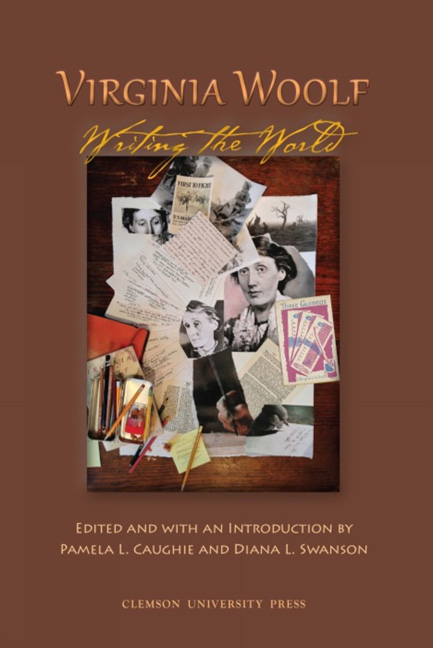Book contents
- Frontmatter
- Table of Contents
- Introduction
- Acknowledgmen
- Abbreviation
- WAR AND PEACE
- Roundtable: Woolf and Violence
- Intersections: Surveillance, Propaganda, and Just War
- Modernism and Memorials: Virginia Woolf and Christopher Isherwood
- Taking Up Her Pen for World Peace: Virginia Woolf, Feminist Pacifist. Or Not?
- The Sex War and the Great War: Woolf's Late Victorian Inheritance in Three Guineas
- Sky Haunting: The British Motor-Car Industry and the World Wars
- The 1914 “Expurgated Chunk”: The Great War in and out of The Years
- “beauty, simplicity and peace”: Faithful Pacifism, Activist Writing, and The Years
- Virginia Woolf, Katharine Burdekin, and Britain's Cosmopolitan Musical Culture
- Death in the Air: Virginia Woolf and Sylvia Townsend Warner in World War II
- WORLD WRITER(S)
- ANIMAL AND NATURAL WORLD
- WRITING AND WORLDMAKING
- Notes on Contributors
- Conference Program
- Appendix: Virginia Woolf Conference Exhibit Items, Newberry Library
Virginia Woolf, Katharine Burdekin, and Britain's Cosmopolitan Musical Culture
from WAR AND PEACE
- Frontmatter
- Table of Contents
- Introduction
- Acknowledgmen
- Abbreviation
- WAR AND PEACE
- Roundtable: Woolf and Violence
- Intersections: Surveillance, Propaganda, and Just War
- Modernism and Memorials: Virginia Woolf and Christopher Isherwood
- Taking Up Her Pen for World Peace: Virginia Woolf, Feminist Pacifist. Or Not?
- The Sex War and the Great War: Woolf's Late Victorian Inheritance in Three Guineas
- Sky Haunting: The British Motor-Car Industry and the World Wars
- The 1914 “Expurgated Chunk”: The Great War in and out of The Years
- “beauty, simplicity and peace”: Faithful Pacifism, Activist Writing, and The Years
- Virginia Woolf, Katharine Burdekin, and Britain's Cosmopolitan Musical Culture
- Death in the Air: Virginia Woolf and Sylvia Townsend Warner in World War II
- WORLD WRITER(S)
- ANIMAL AND NATURAL WORLD
- WRITING AND WORLDMAKING
- Notes on Contributors
- Conference Program
- Appendix: Virginia Woolf Conference Exhibit Items, Newberry Library
Summary
Important recent work has demonstrated how Virginia Woolf found in music and sound a fascinating means to engage the political violence and nationalism that preoccupied Europe during the 1930s. Michele Pridmore-Brown, for instance, has proposed that in Between the Acts (begun in 1938, published posthumously in 1941) Woolf depicts how music can serve as a violently “controlling” force symbolic of “fascism's emphasis on acoustic communion,” while “noise” or “static” can lead to the disruption of coercive musical meanings (411–12). Emma Sutton has suggested that in Between the Acts and elsewhere Woolf used “musical allusions [to] critique the nationalism characteristic of much contemporary British music and discourses about music” (122). While not discounting these persuasive claims, I want to argue that Woolf likewise drew on popular British discourses that promoted the peaceful connotations of classical music and that she even anticipated the British public's widespread reassertions of these peaceful connotations during World War II.
I want to emphasize, in other words, how Woolf's depictions of music promoted and even predicted the continuation of what I will call Britain's popular musical cosmopolitanism, a widely acknowledged, shared European heritage developed specifically and uniquely in Britain through the music of Bach, Beethoven, Handel, Mozart, and even Wagner. Consequently, my analysis draws on Melba Cuddy-Keane's suggestion that in Woolf's work an “objet sonore ” can provide a “bridge between the individual and the world” and can convey “a wholeness, a comprehensiveness, that embraces the communal life of the universe” (90). The “objet sonore ” on which I wish to focus is classical music with a German provenance, which with its “comprehensiveness” actually reinforces conceptions of a “communal” European culture. A significant portion of Britain's early twentieth-century public was intensely invested in classical music, much of it associated with Germany. Individual amateurs listened to and performed Bach, Beethoven, and Handel; Sir Henry Wood off ered weekly “Wagner Night[s]” at the Queen's Hall; and the BBC dispersed a plethora of nominally German compositions from 1922 onward, interweaving German music into British everyday life. This was part of the democratizing force of radio technology, which, as Pamela Caughie has noted, from its inception fostered an “emerging mass culture” the “aesthetic implications” of which Woolf consistently, if cautiously, engaged (333).
- Type
- Chapter
- Information
- Virginia Woolf: Writing the World , pp. 69 - 75Publisher: Liverpool University PressPrint publication year: 2015



